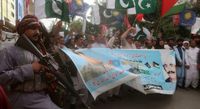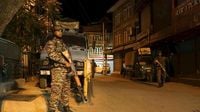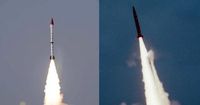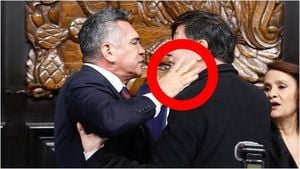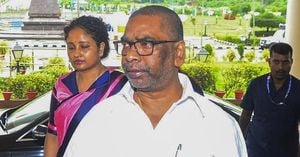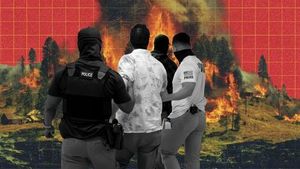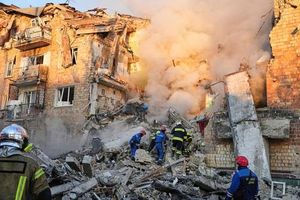On April 22, 2025, the Lashkar-e-Tayyaba (LeT) group perpetrated a terrorist attack in Pahalgam, Kashmir, resulting in the deaths of 25 Indian citizens and one Nepalese citizen. The repercussions of this brutal attack have rippled through the region, igniting violence and repression against the Kashmiri and Muslim communities across various states in India.
In the aftermath of the attack, many Kashmiri students studying in other Indian states have returned home, fearing for their safety as they have been labeled as terrorists. Imaad, a young journalist from Kashmir who requested anonymity, expressed deep concern over the escalating situation. “The attack has been condemned by our entire community, which has shown solidarity with the victims’ families. One of our own was killed while trying to save a tourist. But there are politicians who are exploiting religion. The Muslim and Kashmiri communities are facing violence and repression everywhere,” he stated.
Imaad pointed to an increase in anti-Islamic campaigns, particularly by the Rashtriya Swayamsevak Sangh (RSS), a Hindu nationalist paramilitary organization closely affiliated with Prime Minister Narendra Modi's Bharatiya Janata Party (BJP). He recounted troubling incidents where Kashmiri students faced hostility, saying, “We are labeled as terrorists and traitors. Students, especially, are afraid of threats from RSS goons and are returning to Kashmir. My cousins, who returned home recently, were even denied the purchase of a bottle of water in stores. Terrorism has nothing to do with religion, yet politicians incite violence with hate speech to secure their positions at any cost.”
The violence escalated further on April 23, 2025, when three men in Agra shot and killed a Muslim man in what was claimed to be retaliation for the Pahalgam attack. In Vrindavan, Uttar Pradesh, Hindutva groups called for a boycott of Muslim workers and artisans at the Banke Bihari Hindu temple, where many contribute to the production of garlands, clothing, and crowns for the deities. However, priests at the temple rejected the call, emphasizing the significant contributions of Muslim artisans over decades.
Meanwhile, in Kashmir, which is one of the most militarized regions in the world, the central government's measures have further worsened local living conditions. Imaad reported, “New troops have been deployed, and there has been a significant increase in checkpoints.” Following the attack, security forces allegedly detained and interrogated at least 2,800 people, with over 150 still in custody, although the exact numbers remain unclear. Alongside these detentions, the homes of nine families suspected of having ties to LeT have been demolished, causing damage to many nearby houses.
Political leaders in Kashmir have labeled the demolitions as counterproductive, with local protests erupting against what residents describe as collective punishment for families that have lost ties to suspects who have often left home long ago. Amidst this delicate situation, Kashmir’s Chief Minister, Abdullah Omar, has called for unity and solidarity, temporarily setting aside demands for autonomy that were suspended in 2019 with the abrogation of Article 370 by Modi’s government.
However, the political discourse suggests that Modi and the BJP may be exploiting the moment to silence any critical voices against their governance, inflaming internal tensions within the country. The call for “punishment” and war against Pakistan, which denied involvement in the attack and called for an independent international investigation, has gained traction among government parties and in the press. On April 27, Karnataka Chief Minister Siddaramaiah stated on X that “war should be the last resort of a nation, not the first and only option.” His remarks sparked accusations from government officials that he was “speaking the language of Pakistan.” The Congress party, led by Rahul Gandhi, quickly distanced itself from Siddaramaiah’s comments, which have drawn sustained attacks from the ruling party.
In a further escalation, India suspended visas for Pakistani citizens, ordering them to leave the country. Many have already crossed the border back home, but numerous Pakistani citizens found themselves stranded at the border after Pakistan closed its entry points. “These are political games where human lives are treated as pawns,” Imaad lamented during a phone call.
As tensions continued to rise, India launched a series of missile attacks on May 6, 2025, targeting three Pakistani cities: Kotli, Bahawalpur, and Muzaffarabad, in an operation dubbed “Operation Sindoor.” The official objective was to strike terrorist bases linked to the Pahalgam attack. In response, Pakistan reported civilian casualties, including a child killed in Bahawalpur, and threatened retaliation. Pakistani Prime Minister Shehbaz Sharif condemned the attacks as “cowardly” and asserted that Pakistan had the right to respond with force to this act of war imposed by India. “The entire nation stands with our armed forces on how to deal with the enemy,” he stated.
From India’s perspective, the intervention was described as a measured response, with the Ministry of Defence asserting that no military structures were targeted. However, missiles crossed the Line of Control, causing explosions and panic in Muzaffarabad, where residents reported blackouts and sirens. Pakistani forces activated fighter jets to patrol their airspace, claiming that Indian aircraft did not enter their territory.
The situation remains precarious as the world watches the escalating conflict between two nuclear powers, both of whom have a long history of hostilities over Kashmir. The Indian government’s narrative insists on surgical strikes against terrorist infrastructure, while Pakistan decries the attacks as unprovoked aggression against civilians. Amidst this backdrop, international calls for de-escalation have emerged, with Russia offering to mediate between the two nations. Yet, neither Modi nor Sharif appear willing to soften their stances, raising the specter of further violence and civilian casualties in a conflict that has yet to find resolution.
